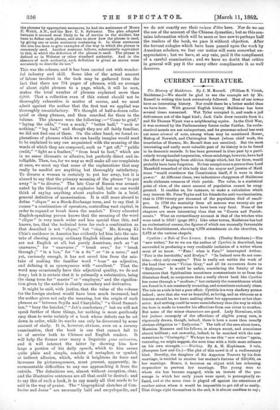Cynthia : a Tale of Two Lovers. 2 vols. (Tinsley
Brothers.) —The "new writer," for so we see the author of Cynthia is described, has succeeded in producing a very creditable imitation of a writer whom most of us know. " Fate ! what is Fate ? ' interrupted Arthur. Fate is the inevitable,' said Evelyn." "In Ireland men do not corn- bine,—they only conspire." This is really not unlike the work of the hand that wrote " Vivian Grey," and all its successors down to Endymion." It would be unfair, considering the fatuity of the utterances that Spiritualists sometimes communicate to us from the illustrious dead, to conjecture that a really clever book like Cynthia has come through a " medium ;" but certainly the resemblances which are found in it are constantly recurring, and sometimes curiously close. The tale as a tale is but a poor affair. Cynthia is a very shadowy person indeed ; save that she was as beautiful, as loving, and as virtuous as a heroine should be, we learn nothing about her appearance or her char- acter. And nothing could be more unsatisfactory than the way in which the hero is made to transfer his affections from one sister to another. But some of the minor characters are good. Lady Hermione, with her jealous monopoly of the affections of eligible young men, is vigorously drawn, though, indeed, there is here a more than usually obvious obligation to ‘• Endymion." The talk of the men about town, Marmion Manners and his fellows, is always smart, and sometimes almost brilliant ; not unworthy, indeed, to be matched with the con- versations in " Coningsby." We hope to see this " new writer " again, venturing, we might suggest, the next time with a little more reliance on his own strength.—Waiting. By A. M. Hopkinson. 3 vols. (Sampson Low and Co.)—The plot of this novel is of a rudimentary
kind. Dorothy, the daughter of Sir Augustus Travers by his first marriage, is entitled to receive her mother's fortune of £50,000, on her marriage. Hence, it becomes an object with her scheming stepmother to prevent her marriage. The young man to
whom she has become engaged, while an inmate of the par- Renege in which her early years were spent, is peremptorily re- fused, and at the same time is played off against the attentions of another suitor, whom it would be impossible to get rid of so easily. That things right themselves in the end, it is almost needless to say ;
and the tale, in which the poverty of the main subject is agreeably supplemented by stirring episodes and by plots, is quite readable. It would, however, have been far better as a novelette of dimensions far less pretentious than these three volumes.—Viscount Lacklands. By Major Arthur Griffiths. (Remington.)—An impoverished aristo- crat and a nouveau riche are the principal characters in this little tale. The aristocrat, assuming an incognito which has a somewhat improbable air, becomes the millionaire's clerk. The millionaire has a daughter, who begins by despising and ends by loving the humble subordinate. There is a secret, and a ticket of-leave man, in whose keeping the said secret is. Here are the chief ingredients of Major Griffiths' tale. That it is readable, if one is not too exacting, is about as much as can be said for it.



































 Previous page
Previous page